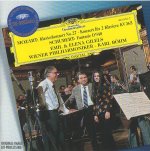The return of this important recording to the catalog as a mid-priced reissue is to be warmly welcomed. The performances by the father/daughter partnership of Emil and Elena Gilels are superb, as is the orchestral support provided by Karl Böhm and the Vienna Philharmonic in Mozart’s last solo piano concerto (K. 595), and in the big double piano concerto (K. 365). New audio re-processing has greatly enhanced sound quality overall, and there’s none of the brittle piano timbre that dogged earlier releases of these performances. The fortissimo sections of the double concerto also are reproduced smoothly and without a trace of distortion, even at higher playback levels.
Emil Gilels’ account of K. 595 is an impressively thoughtful one, and the cohesion of his partnership with Böhm often is suggestive of that between Clifford Curzon and Benjamin Britten in their Decca recording from Aldeburgh. But the Vienna Muiskvereinsaal brings greater depth and transparency to the sound, and Gilels scales down his normally massive approach (in the romantic warhorses for which he was famed) to suit Mozart’s classical proportions and semantics. What also impresses is the delicate simplicity of his expression; the larghetto is taken as it appears on the printed page, and Gilels’ tastefully idiomatic phrasing of the main theme is flexible and lithe. In the opening Allegro, he also accompanies sensitively, retreating into the background during passages involving the winds, yet still stressing the unexpected and frequent chromatic inflections with tremendous subtlety. The Vienna oboe is splendid, too, particularly approaching the crucial first movement recapitulation, and Gilels plays Mozart’s cadenzas in both first and last movements.
The performance of the double concerto is a joyous, exultant affair, and you’re left feeling that two outstanding artists are simply enjoying themselves, for at no time do you sense anything other than equilibrium between them. There certainly are more powerful and dramatic accounts, led by the Sony version with Perahia and Lupu, but if the Gilels duo is somehow less majestic in the first movement, it’s mightily effective as a finely balanced and intuitive partnership, and DG’s transfer sounds magnificent.
Last comes the searching F minor Fantasie by Schubert, which the two pianists perform with dignity and refinement. However, it’s doubtful that this account will displace readings by specialist Schubertians, such as Paul Badura Skoda and Jörg Demus in their exceptional and deeply insightful Auvidis recording from 1988. Elsewhere, competition is less searching, though, and the Gilels recording ultimately proves a better bet than Perahia and Lupu at full price on Sony, offering good value for money and sound that’s hardly less brilliant and clear.
































